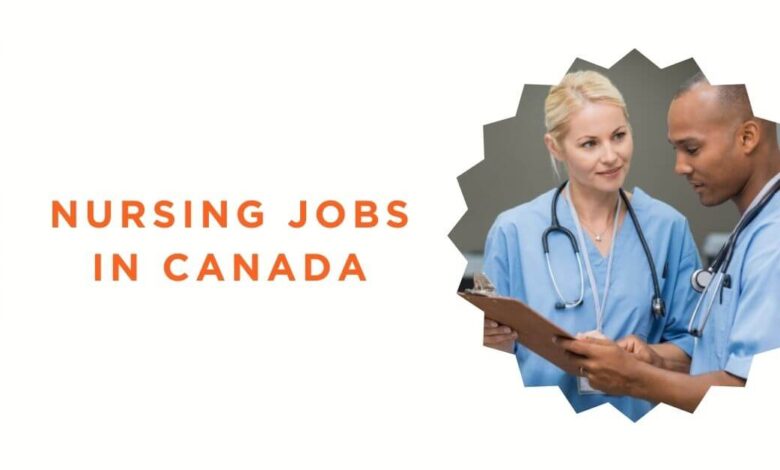
Nursing Jobs in Canada 2025 – Apply Now
Currently, there are more than 11,000 registered nurse (RN) positions available in Canada, as reported by the Canadian Job Bank. It is probable that this figure will rise in the future as the demand for nurses continues to increase. Foreign nationals who are interested in pursuing a career as nurses in Canada are presented with an exceptional opportunity.
The salary of a nurse in Canada is contingent upon the type of work they perform, their level of experience, and the location where they work. The annual salary of an RN is approximately $75,000 on average.
Check Also: Personal Caregiver Jobs in Canada – Visa Sponsorship
Nursing Jobs in Canada by Province:
- Ontario
- British Columbia
- Alberta
- Quebec
- Manitoba
Benefits of Nursing Jobs in Canada:
- High Demand: Canada is experiencing a shortage of nurses, which has resulted in a plethora of employment opportunities throughout the nation. The demand for nurses is anticipated to increase in the future as a result of the retirement of current nurses, the expansion of the healthcare system, and an aging population.
- Competitive Salaries: Nurses in Canada typically receive competitive salaries, which include the possibility of receiving overtime pay and additional incentives. Salary levels may fluctuate by factors such as location, experience, and specialization.
- Comprehensive Benefits: A significant number of nursing positions in Canada are accompanied by comprehensive benefits packages, which include health insurance, dental coverage, retirement programs, and paid vacation time. The overall financial stability and well-being of nurses are influenced by these benefits.
- Work-Life Balance: Employers in the Canadian healthcare sector frequently emphasize work-life balance and provide a variety of flexible scheduling options, such as part-time, full-time, and shift work. This adaptability enables nurses to reconcile their professional obligations with their interests and obligations.
- Career Advancement Opportunities: Nursing is a multifaceted profession that offers a plethora of opportunities for specialization and career advancement. Nurses in Canada have the opportunity to enhance their earning potential and advance their careers by pursuing additional education, certifications, and specialized professional training.
- Continuous Professional Development: Canadian healthcare organizations prioritize the continuous professional development of nurses by offering them access to training programs, seminars, conferences, and continuing education opportunities. This dedication to professional development guarantees that nurses remain informed about the most recent developments and best practices in the healthcare field.
- Job Security: Nursing is a profession that is recession-resistant and stable, providing high job security even during economic downturns. The employment security of nurses is further bolstered by the increasing demand for healthcare services in Canada.
- Safe Working Environments: In order to guarantee the health and safety of patients and healthcare professionals, Canadian healthcare facilities implement rigorous safety protocols and regulations. Nurses can anticipate working in environments that are both secure and supportive, with access to the requisite equipment and resources.
- Travel Opportunities and Diversity: Canada is a country that is diverse, offering nurses the opportunity to work in urban, rural, and remote settings. Additionally, nurses may operate with a variety of patient populations, including Indigenous communities and immigrant populations.
- International Recognition: Canadian nursing qualifications are highly esteemed on a global scale, allowing nurses to work abroad or pursue immigration pathways to other countries. The skills and experience acquired in Canada apply to healthcare systems worldwide.
Common Types of Nursing Jobs in Canada:
- Registered Nurses (RNs) are employed in a variety of settings, including hospitals, long-term care facilities, and community health clinics, to provide direct patient treatment.
- Registered Practical Nurse (RPN): An RPN is responsible for providing direct patient care under the supervision of a registered nurse. The locations in which they operate include hospitals, long-term care facilities, and neighborhood health clinics, among others.
- Nurse Practitioner: Comprehensive primary care services are provided by advanced practice nurses, who are also referred to as nurse practitioners. Furthermore, they have the ability to diagnose and treat illnesses, arrange diagnostic procedures, and recommend medications.
- Nurse Educator: Nurse educators are individuals who instruct nursing students at colleges and universities. Additionally, they offer nurses continuing education.
- Nurse Manager: Nurse managers are responsible for overseeing a team of healthcare professionals and nurses. They are accountable for guaranteeing that patients receive safe and effective care.
Requirements for Nursing Jobs in Canada 2025
- To apply for employment as a nurse in Canada, the following requirements must be met:
- Obtain a nursing license in your country of origin.
- Have a work permit that authorizes you to work in Canada.
- Complete the Canadian Language Benchmarks (CLB) level 7 examination in either English or French.
- Participate in the Canadian Registered Nurses Examination (CRNE).
Education Required for Nursing Jobs in Canada:
The amount of education required for a foreign national to become a nurse in Canada is contingent upon the form of license they wish to obtain.
A bachelor’s degree in nursing from a government-recognized university is required to become a Registered Nurse (RN) in Canada. It is also necessary to pass the National Council Licensure Examination for Registered Nurses (NCLEX-RN).
A diploma in practical nursing from a government-approved Canadian college is required to become a Licensed Practical Nurse (LPN). Additionally, the Canadian Practical Nurse Registration Exam (CPNRE) must be completed.
Before you can file for a nursing license, the Canadian government must review your credentials if you obtained your nursing degree outside of Canada. This is referred to as a credential evaluation.
A list of entities authorized to evaluate credentials is maintained by the government of Canada. A catalog of organizations that have been approved is available on the Canadian government’s website.
A nursing license application must be submitted to the regulatory body in the province or territory where you intend to work after your credentials have been assessed. The requirements for obtaining a nursing license vary by province and territory.
Recruitment Agencies in Canada for Foreign Nursing:
MNM Medical Recruiters Canada
The primary objective of this organization is to recruit nurses from all corners of the globe. They have a team of agents who are proficient in assisting you in locating the perfect job in Canada.
Canadian Health Care Agency
This organization has been granted permission by the government to assist foreign nurses in obtaining work permits in Canada. Additionally, they can assist you in securing employment.
Greenstaff Medical – Canada
Temporary and permanent nurses are employed by this organization, which is a prominent international healthcare staffing agency.
Medrec International
is a second Canadian recruitment agency that provides sponsorship to nurses who have completed international training. Medrec International’s sponsorship program encompasses a comprehensive training program and a pre-departure orientation.
Alliance Recruitment Agency
This organization is a comprehensive employment agency that recruits nurses from all corners of the world. They have a team of agents who are proficient in assisting you in locating the perfect job in Canada.
Dynamic Health Staff
This organization is among the most effective in its efforts to facilitate the employment of foreign nurses in Canada. They have a team of specialized recruiters who can help you navigate the immigration process and secure employment.
It is imperative to conduct research and ensure that the recruitment agency you choose has a strong reputation and experience in locating foreign nurses in Canada. Guarantee that the service is also registered with the Canadian government.
Sites for Nursing Jobs in Canada
A nurse who aspires to work in Canada may apply for one of several work permits. One of the visas enumerated below is obtained by the majority of nurses:
- Federal Skilled Worker Program (FSWP): The Federal Skilled Worker Program (FSWP) is a points-based immigration system that accounts for age, language proficiency, work experience, and education. Eligible nurses are permitted to petition for permanent residency and a work permit under the FSWP.
- Canadian Experience Class (CEC): This program is designed for non-Canadians who have worked full-time in a specialized occupation in Canada for a minimum of one year. Nurses who satisfy the CEC requirements are eligible to petition for permanent residency and a work permit.
- Provincial Nominee Program (PNP): To allure qualified personnel, each province and territory in Canada has its own PNP. The province will provide a work permit and permanent residency to a nurse who is eligible for a PNP.
Conclusion:
Foreign nurses have numerous employment opportunities in Canada. One potential solution is to collaborate with a recruiting agency that specializes in the recruitment of foreign-trained nurses. Canadian Medical Recruiters, NurseRecruiter, and Medrec International are among the most effective resources in Canada for locating foreign nurses.
Furthermore, foreign nurses may utilize online job boards to identify employment opportunities in Canada. Monster and CareerBuilder are both renowned employment websites. Foreign nurses may also seek employment in Canada by contacting Canadian nursing associations, including the Registered Nurses Association of Ontario (RNAO) and the Canadian Nurses Association (CNA).
Lastly, foreign nurses have the opportunity to participate in recruitment events that are held in Canada on a year-round basis. These events provide an exceptional opportunity to establish connections with Canadian organizations that employ nurses with international training.
Frequently Asked Questions:
How do I get a job as a nurse in Canada?
To register with the NNAS, you must fill out an online form, provide information about your demographics, education, and professional experience over the previous five years, and declare all nursing bodies with which you are currently or have previously registered.
In Canada, which nurse is in high demand?
Nursing employment is growing after several years of healthcare restructuring and hospital downsizing. RNs with skills and experience in specialty areas (e.g., emergency, critical care, and operating room) and those willing to work in smaller or isolated communities are in the most demand.
How much is a nurse paid in Canada?
The entry-level nurse in Canada earns $59,875 per year, and the most experienced employee earns up to $105,477 per year. The registered nurse with an entry-level position earns $59,762 per year, while the most experienced worker earns $83,168 per year. The clinical nurse earns $88,396 per year, based on 2175 salaries.




